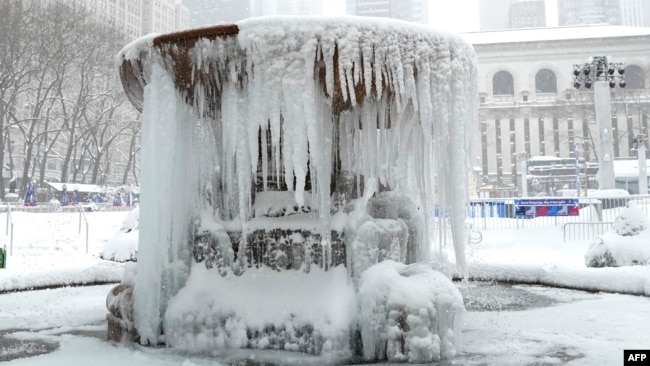Words and Their Stories, from VOA Learning English.
毎回楽しいWords and Their Stories!!
今日はFreeze!!
早速聴きましょう♫
凍結!
Freeze!
4 hours ago /2021/02/21
世界中の多くの場所では、冬になると雪や氷、そして本当に寒い気温になります。場所によっては、深い氷結を経験することもあります。
しかし、本当に気温が低い地域に住んでいなくても、"freeze "の熟語や表現を使うことができます。
例えば、職場でも使えます。
コロナウイルスが大流行している間、多くの職場では雇用凍結を実施しています。雇用凍結があると、より多くの人を雇うことができません。採用プロセスが動きません。It is frozen.凍結されます。
パンデミックの間、多くの企業や企業は財務上の不安にも直面しました。そして、中には生き残れるかどうかわからないものもありました。そのため、多くの場所で賃金を凍結したのではないでしょうか。賃金が凍結されると、現在の水準のままになります。
お金を "凍結" する方法はもう一つあります。法的な問題や金銭的な問題を抱えている場合、裁判所から銀行口座を凍結されることがあります。そうなると、凍結された口座のお金を使うことができなくなります。
さて、"freeze "は前置詞をつけるたびに変化する動詞のひとつです。まずは "out "から始めましょう。"freeze out "という口頭表現になります。
ビジネス上の取引では、ある人やグループが他の人に締め出されてしまうことがあります。もしあなたが取引から閉め出された場合、あなたは関与できません。あなたにはテーブルの席がありません。
あなたが冷たくて感情を持たない人であれば、誰かを社会的に孤立させたくなるかもしれません。あなたはパーティーに彼らを招待しません。あなたは楽しいイベントについて彼らに教えません。あなたは彼らをグループから閉め出そうとします。
しかし、これは意地悪で幼稚にみえます。人を締め出すことは、子供の頃にしたことがあるかもしれません。もし今までに友人がグループからあなたを締めだそうとしたなら、もし傷つくなら- 数年後でさえも。その記憶は、心の中に閉じ込められるます。それは不変であり、時間の経過によって影響を受けません。
さて、口頭フレーズ “freeze up” について話してみましょう。もし何かが “固まったら、動かなくなります。 例えば、エンジンはフリーズすることがありますー動かなくなるというこを意味します。
人も凍りつくことがあります。人が固まってしまうと、とても怖がったり心配したりして、話すことも動くこともできなくなってしまいます。例えば、人前で話すのが怖いと、大勢の人の前で話しているときに固まってしまうことがあります。何も言えなくなったり、何もできなくなったりします。しばしば、私たちは “froze.” ”固まった”という言い方をすることもあります。私はとても怖くてと完全に固まりました。
もちろん、"freeze "という言葉は、いくつかの気象条件を表す言葉でもあります。口頭の "freeze over "は通常、水域を表すときに使われます。a lake has frozen over 場合は、それは完全に凍っています。その上を安全に歩いたり、スケートをしたりすることができます。
しかし、"freeze over "を離れる前に、その表現を使う別の方法を見てみましょう。例えば、何かが起こる可能性がない、ノーチャンスのような場合は、"when hell freezes over "と言います。地獄は暑い場所のはずです。だから、もし凍りついたら、物事が悪いことが分かります。
例を挙げてみましょう。
Hey, Alyssa I got my boating license yesterday. How about you join me on the river sometime?
やあ、アリッサ。 おれさ昨日ボートの免許を取ったんだ。 いつか一緒に川に行かない?
Sure ..Bradley ... when hell freezes over!
いいわよ ブラッドリー...地獄が凍りついたらね!
Aw come on! It’ll be fun! Why not?
いいじゃないか!楽しいよ!どうしてだめなの?
First, I can’t swim.
まず 私は泳げないの。
That’s okay. You can stay in the boat.
大丈夫だよ。ボートの中にいれば。
And second, I’ve seen you drive. There's no way I'm getting in a boat with you.
第二に、私はあなたが運転するのを見てきたのわ。あなたと一緒にボートには乗れないわね。
That’s cold, Alyssa. Real cold.
冷たいな、アリッサ 。本当に冷たいよ。
“never.” "絶対に "って言うのは面白い言い方ですね。 冗談で使います。 就職の面接の時や 親に初めて会う時などには個人的には深刻な状況では 使いません。
言葉とそれらの物語はこれでおしまい。
このお話しが好きかもしれない友人を知っていたら、彼らを締め出さないでくださいね!招待してください。
英語の小窓 -freeze のイディオム
本編以外のイディオムを紹介します。
be frozen in time : 時間が止まる
freeze off : 〈人・申し出などに〉冷たい態度を示す
freeze (on) to [onto] A : Aに執着する
最後に
Freeze! って言われたら、”止まれ”、止まらないと銃で撃たれますよ!!
Freeze!
 This photo is of a frozen fountain in New York City's Bryant Park during a winter storm on February 1, 2021. (Photo by TIMOTHY A. CLARY / AFP
This photo is of a frozen fountain in New York City's Bryant Park during a winter storm on February 1, 2021. (Photo by TIMOTHY A. CLARY / AFP
In many places around the world, wintertime brings snow, ice, and really cold temperatures. Some places can even experience a deep freeze!
But even if you do not live in an area with really low temperatures, you can still use “freeze" idioms and expressions.
For example, you could use them at work.
During the coronavirus pandemic, many workplaces have put in place hiring freezes. With a hiring freeze, you are not able to hire more people. The hiring process is not moving. It is frozen.
During the pandemic, many businesses and companies also faced financial uncertainties. And some were not sure they would survive. So, many places may have put a freeze on wages. When your wages are frozen, they stay at the current level.
There is another way we “freeze” money. If you are having legal or financial trouble, the courts might freeze your bank accounts. When this happens, you cannot use money in a frozen account.
Now, “freeze” is one of those verbs that changes with every preposition you add to it. Let’s start with “out.” It makes the verbal expression “freeze out.”
Sometimes in business dealings, some people or groups may get frozen out by others. If you are frozen out of a business deal, you are not involved. You don’t have a seat at the table.
If you are a cold, unfeeling person, you may want to isolate someone socially. You don’t invite them to parties. You don’t tell them about fun events. You are trying to freeze them out of a group.
But this seems mean and childish. Freezing people out is something we might have done as children. If you ever have had a friend try to freeze you out of a group, if can hurt -- even years later. That memory can be frozen in your mind. It is unchanging and unaffected by the passing of time.
Now let’s talk about the verbal phrase “freeze up.” If something “freezes up” it stops working. An engine, for example, can freeze up – meaning it stops running.
People can also freeze up. If a person freezes up, they are so afraid or worried, they are unable to speak or move. For example, if I am afraid of public speaking, I might freeze up while speaking in front of a large group of people. I’m not able to say or do anything. Sometimes we can also just say “froze.” I was so afraid that I just completely froze.
Of course, the word “freeze” also describes some weather conditions. The verbal “freeze over” is usually used to describe a body of water. If a lake has frozen over it is completely frozen. You can safely walk or skate on it.
But before we leave “freeze over,” there is another way we use that expression. For example, if something is never going to happen, like not a chance, I can say “when hell freezes over.” Hell is supposed to be a hot place. So, if it freezes over, you know things are bad.
Here’s an example,
Hey, Alyssa I got my boating license yesterday. How about you join me on the river sometime?
Sure ..Bradley ... when hell freezes over!
Aw come on! It’ll be fun! Why not?
First, I can’t swim.
That’s okay. You can stay in the boat.
And second, I’ve seen you drive. There's no way I'm getting in a boat with you.
That’s cold, Alyssa. Real cold.
So, it’s a funny way to say “never.” We use it jokingly. Personally, I would not use it in any serious situations, such as during a job interview or when meeting someone’s parents for the first time.
And that’s all the time we have for this Word and Their Stories.
If you know friends who might like this show, don’t freeze them out! Invite them to listen.
________________________________________________________________
Words in This Story
wage – n. a payment usually of money for labor or services usually according to contract and on an hourly, daily, or piecework basis —often used in plural
isolate – v. to set apart from others
skate – v. to move or glide over a surface on skates